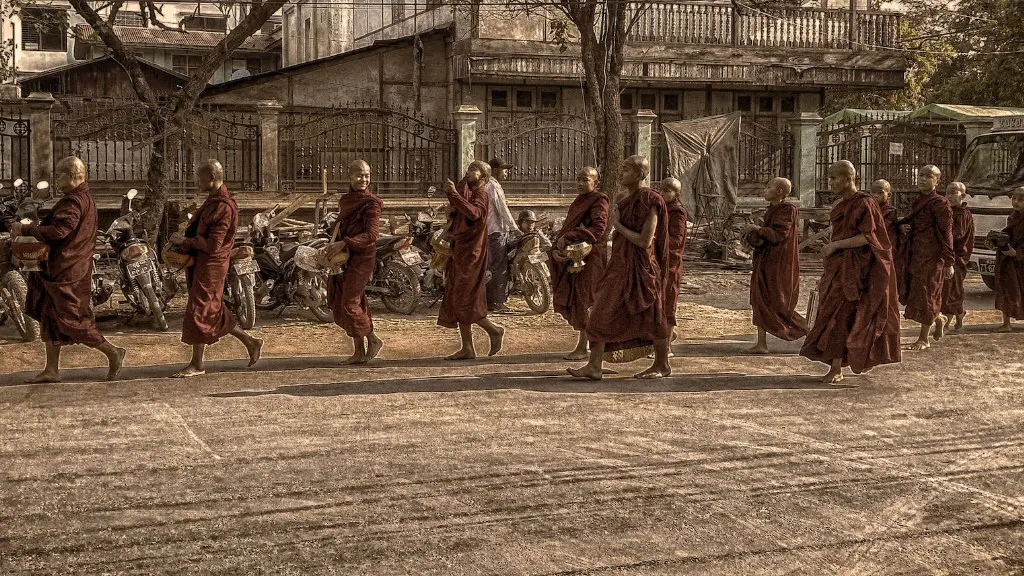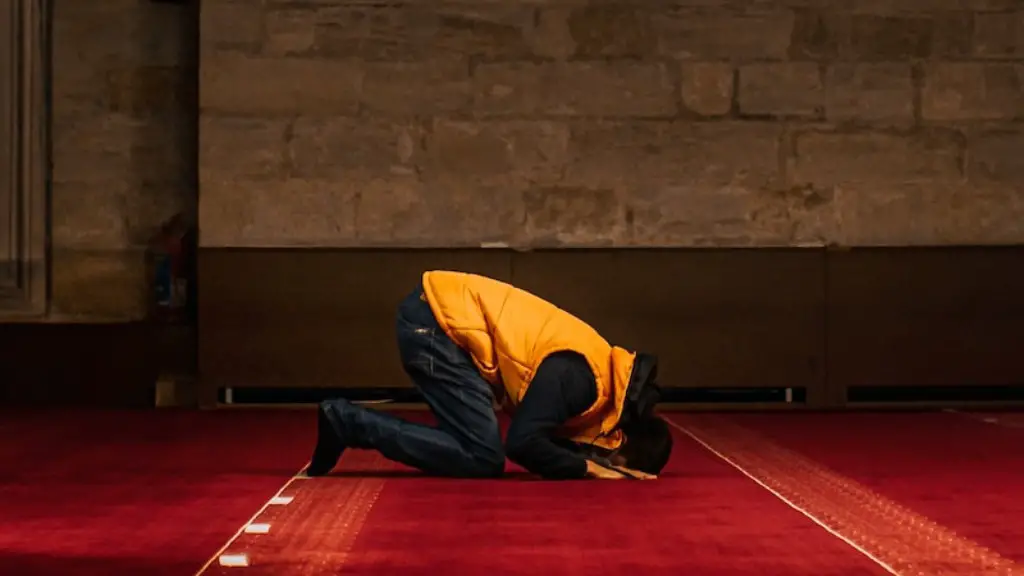Buddhism is a religion that was founded by Siddhartha Gautama, also known as the Buddha, in the 4th or 5th century BCE. The Buddha was born in Nepal and raised in a wealthy family. He later renounced his wealth and lifestyle to live as a monk and spread his teachings. The major beliefs of Buddhism include the Four Noble Truths, the Eightfold Path, and karma.
There are many schools of Buddhism, and beliefs can vary somewhat between them. In general, Buddhists believe in the Four Noble Truths: that suffering exists; that suffering has a cause; that there is an end to suffering; and that there is a path to that end. Other major beliefs include the law of karma (that a person’s actions in this life affect their future lives), and the idea of nirvana (a state of perfect peace and enlightenment).
What are the 3 main beliefs of Buddhism?
Buddhism is a religion that is based on the teachings of Siddhartha Gautama. The main principles of this belief system are karma, rebirth, and impermanence. Buddhism teaches that we are all interconnected and that our actions have consequences. We are also reborn into different forms after we die based on our karma. impermanence is also a key concept in Buddhism, as everything is constantly changing.
The Five Precepts are a set of guidelines for living a moral and ethical life. They are:
1. Refrain from taking life
2. Refrain from taking what is not given
3. Refrain from the misuse of the senses
4. Refrain from wrong speech
5. Refrain from intoxicants that cloud the mind.
These precepts provide a framework for living a good life, and help us to avoid causing harm to others.
What are the 4 main beliefs of Buddhism
The Four Noble Truths are the foundation of the Buddhist teachings. They are the truth of suffering, the truth of the cause of suffering, the truth of the end of suffering, and the truth of the path that leads to the end of suffering. More simply put, suffering exists; it has a cause; it has an end; and it has a cause to bring about its end.
The Four Noble Truths are not meant to be a pessimistic view of life, but rather a realistic one. Buddhism does not teach that life is perfect and that we should try to escape from all suffering. Instead, it teaches that suffering is a part of life and that we can find a way to end it.
The first Noble Truth is that suffering exists. This is not just the suffering that comes from physical pain, but also the suffering that comes from mental anguish. We all experience suffering at some point in our lives, and it is an inescapable part of life.
The second Noble Truth is that the cause of suffering is attachment. We suffer because we are attached to things that we cannot have or that we cannot hold on to. We are attached to our possessions, to our ideas, and to our desires. When we are attached to
The Eightfold Path is a series of eight steps that Buddhists can follow to help them lead a contented (satisfactory) life. The steps are: Right Understanding; Right Thought; Right Speech; Right Action; Right Livelihood; Right Effort; Right Mindfulness; Right Concentration.
What is one of the most important beliefs in Buddhism?
The Buddha realized that the root of all suffering is our ignorant attachment to the transitory things of this world. By understanding the impermanent and no-self nature of all things, we can let go of our attachment and find lasting peace.
Buddhism is a religion that does not acknowledge a supreme god or deity. Followers instead focus on achieving enlightenment—a state of inner peace and wisdom. When followers reach this spiritual echelon, they are said to have experienced nirvana. The religion’s founder, Buddha, is considered an extraordinary being, but not a god.
What are the 3 main beliefs of Buddhism quizlet?
Buddhism is a religion and philosophy founded in India by Siddhartha Gautama. With about 500 million followers, Buddhism is the fourth-largest religion in the world. Buddhism teaches that life is full of suffering and that suffering is caused by attachment and desire. The goal of Buddhism is to end suffering by living a life of detachment, compassion, and love. Buddhists believe in karma, reincarnation, and enlightenment. Nirvana is the highest state of bliss and can be attained through the practice of meditation. The Four Noble Truths and the Eightfold Path are the main teachings of Buddhism.
The Seven Factors of Awakening are an important part of Buddhist tradition. They are known within the religion as “inner wealth” and are considered to be seven mental capacities of great value. The seven factors are mindfulness, investigation, energy, joy, tranquillity, concentration, and equanimity. Each one of these factors can help to improve our lives and make us more contented and fulfilled individuals.
Do Buddhists believe in heaven
In Buddhism, there is no concept of punishment or reward and there is no divine being who decides who goes to hell or heaven There is merely the illusory results of our thought, words and deeds, which we call karma. Karma is the result of our actions, and it can either be positive or negative. If we have negative karma, it will come back to us in the form of suffering. If we have positive karma, it will come back to us in the form of happiness.
From a Buddhist perspective, death is not an end, but a transition from one stage of life to the next. Buddhists believe that consciousness (the spirit) continues after death and may be reborn into another person or animal. Death can be an opportunity for liberation from the cycle of life, death and rebirth.
What do Buddhists think of Jesus?
There are some high level Buddhists who have drawn analogies between Jesus and Buddhism. For example, in 2001 the Dalai Lama stated that “Jesus Christ also lived previous lives”, and added that “So, you see, he reached a high state, either as a Bodhisattva, or an enlightened person, through Buddhist practice or something like that”. Thich
The Ten Grave Precepts are a set of ethical guidelines for Buddhist practitioners. They cover a wide range of topics including respect for life, giving, honoring the body, manifesting truth, proceeding clearly, and recognizing the perfection of all beings. The precepts are designed to help practitioners live in a way that is in alignment with the Buddha’s teachings.
What is the Buddhist way of life
The Middle Way is the Buddhist way of life; it is a self-development progression through the Noble Eight-fold Path. The Noble Eight-fold Path comprises of Right Understanding, Right Thought, Right Speech, Right Action, Right Livelihood, Right Effort, Right Mindfulness, and Right Concentration. The Middle Way is the way to achieve Nirvana, which is the goal of Buddhism.
Despite what many people believe, many Buddhists do celebrate the holiday season. In fact, three-quarters of Asian American Buddhists celebrate Christmas. For some Buddhists, Dec 8 is also Bodhi Day, which marks when the Buddha reached enlightenment. No matter what holiday they celebrate, Buddhists all over the world enjoy this time of year.
Can a Buddhist drink?
Buddhism teaches that alcohol and other drugs can cause carelessness and should be avoided. Strong Buddhist beliefs would be expected to have a significant impact on alcohol use.
For Buddhists, karma extends beyond this life. Bad actions in a previous life can follow a person into their next life and cause bad effects. Even an enlightened one is not exempt from the effects of past karma.
Final Words
There are three major beliefs in Buddhism:
1. The Four Noble Truths – that life is suffering, that suffering is caused by desire, that suffering can be ended by eliminating desire, and that this can be achieved by following the Eightfold Path.
2. Karma – that our actions have consequences, and that our current circumstances are the result of our past actions.
3. rebirth – that our soul is reborn into another body after we die, and that we can eventually achieve liberation from the cycle of birth and death.
The major beliefs of Buddhism are that all beings have the same potential for awakening, that Buddha is a guide but not a god, and that we must all take responsibility for our own liberation.




